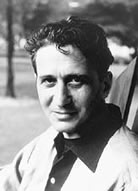| |

Read more about
Hostovský here
|
|
egon hostovský
Egon Hostovsky was one of the most distinctive figures in Czech prose as well as one of the
most prolific. He was born as the youngest of eight children to a Jewish family in the
northeastern Bohemian town of Hronov in 1908 where his father was the co-owner of a small
textile factory. After finishing Gymnasium in Náchod in 1927, he studied at Charles University
in Prague, and then in Vienna in 1929. Throughout the 1930s, he served as editor in the Prague
publishing house Melantrich. During this period he published a number of novels, among them
Lost Shadow (1931), The Black Mob (1933), The Arsonist (1935), for which
he was awarded Czechoslovakia's State Prize for Literature in 1936, and A House without a Master (1937).
These were translated at the time into other European languages, notably Danish, French, Flemish, and German, and
marked Hostovský as one of the leading figures of that generation of Czech writers.
In February, 1939 he left to Brussels on a lecture tour. As a result of the German occupation of Czechoslovakia, he
continued on to Paris and then to Lisbon before arriving in New York in February, 1940 where he stayed during the war.
His father, sisters, and their families, perished in concentration camps. He returned for a brief period to
Czechoslovakia in 1946, working in the Ministry of Foreign Affairs and then in the embassy in Norway as a legal
secretary, later as Charges d'Affaires. He resigned his post in 1949 and returned to the United States in February,
1950, where he taught Czech at a language school, wrote for American newspapers, and for five years was editor of the
Radio Free Europe. He died in Montclair, New Jersey, in 1973.
Much admired by Graham Greene, Hostovský's novels written in exile, such as Seven Times the Leading Man and
The Plot, were immediately translated into English (often preceding or even without publication in Czech),
thus establishing him as a noted world author.
|
|
 |
|

published by TSP:
The Arsonist
|